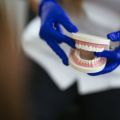Getting Rid of Your Lower Denture for Good

People who wear dentures will frequently find them problematic to deal with and especially after wearing them for a few years or more. Lower dentures can be particularly awkward and have their own specific problems due to diminishing retention.
This can make the dentures uncomfortable to wear at best, or even painful as they rub on the gums while moving around in the mouth. Eating becomes more awkward, as foods are trickier to chew and this can limit food choices, making it harder to choose nutrient-dense foods required for good overall health. Many social occasions are centered around mealtimes, and often people who struggle with dentures will turn down invitations, potentially increasing their sense of social isolation. Also, when dentures are loose and ill-fitting, they can move around while talking which can be embarrassing, to say the least!
Why Do Lower Dentures Become So Ill-Fitting?
The reason why lower dentures become so badly fitting within quite a short space of time is because of the way your jawbone changes shape after natural teeth are removed. Your natural teeth have long tooth roots, extending into the jawbone and while one function is to hold your teeth in place, these tooth roots provide vital stimulation to the bone, ensuring old bone cells are continually renewed as they die off. Once your natural teeth are removed, this crucial stimulation is lost, and the jawbone gradually remodels as the bone diminishes. Unfortunately, the effect reduces the width and height of the bony ridge that used to support your natural teeth, and which is essential for denture retention. Without this retention, it’s challenging to hold the denture in place securely, and although lower dentures can be relined or remade to fit a little better, it does nothing to address the overall problem of bone loss.
If this sounds familiar and is something you struggle with, or you have a close family member or good friend with loose dentures, there is a solution that can get rid of lower dentures for good.
How Dental Implants Can Help
While dentures may have been around for hundred years or more, dental implants are a far more modern solution and are fast becoming the gold standard for restoring complete arches of teeth. A lower denture can be secured with as few as two dental implants which are strategically situated to provide the necessary support. The denture, called an implant overdenture, has special attachments on the surface closest to the gums and which clip onto the dental implants in the jawbone. Another solution is to get rid of dentures entirely, replacing them with a bridge of teeth that are permanently fixed in place. This solution normally requires a greater number of dental implants and the dental bridge restoring the arch of teeth is screwed or cemented onto the implants.
Imagine the freedom of having teeth that no longer move or rub uncomfortably on the gums. Think about all the foods that suddenly become accessible because your biting force will increase considerably with implant-supported teeth. With implant-supported teeth, social occasions become pleasurable because concerns about teeth that move while you talk, or laugh are eliminated.
Dental implants are all about improving quality of life, and people who have received implant-supported dentures or who have replaced their dentures with a fixed arch of teeth will frequently feel more satisfied and happier in life. Also, because a loss of jawbone affects appearance, having implant-supported teeth can improve appearance. Implant dentures and implant bridges are carefully constructed to replace the loss of height between the upper and lower jaw and to provide the correct support for facial muscles in the cheeks and lips. When normal facial contours are restored, it can prevent that collapsed-in look that is common amongst denture wearers and which is prematurely aging.
Who Can Have Dental Implants?
Dental implants are a hugely successful and predictable treatment that can help most people, but despite this, some people think age is a barrier. Think dental implants are only for young people? Think again! In fact, this treatment has been successfully completed in people who are in their 80s or older. Factors that are far more significant include your current dental health and your overall health, and your teeth and jaws must have finished growing and developing. Dental implant treatment isn’t usually suitable for people under the age of 18.
Why Does Overall Health Matter?
Overall health is important because dental implants require a small surgical procedure to insert them into the jawbone. Once the dental implants are inserted into the jawbone, they must heal and integrate with the bone around them. Healing can be delayed if you have health problems affecting your immune system or other medical issues. Delayed healing could increase the chance of implant failure. Your implant dentist will assess your general and dental health very carefully and will need detailed information about your medical history to ensure this treatment is the best solution. Usually, the success rate of dental implant treatment is typically 95%, but some of the more experienced and highly trained implant dentists have success rates that are even higher.
You Don’t Need to Be Scared of Implant Surgery
The surgery for dental implants might sound scary, but it really isn’t! This procedure usually is very short, and a single implant can be placed in an hour or even less. Also, many dental implant dentists offer dental sedation for more nervous patients, or for people requiring multiple dental implants. You can rest assured that you will be comfortable and relaxed during this treatment so don’t let it put you off. Options for dental sedation will most likely include IV or intravenous sedation and which is also known as sleep dentistry because you could well sleep through treatment. With IV sedation, you feel so deeply relaxed that you will most likely remember nothing or very little about the procedure. Instead, you’ll wake up with your new implants in place, ready to be fitted with your temporary teeth while healing occurs. Once healing is completed two or three months later, your permanent teeth are made and fitted. All you need do is enjoy life without ill-fitting dentures.
Other articles and publications:
Articles and publications of other companies:
- +1 (646) 270-9836
- Long Island City
- grantny.com











